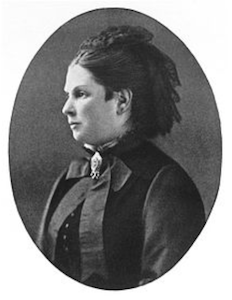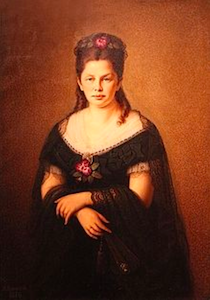Born on August 5, 1937, Anna Pavlovna Filosofova lived a lavish childhood. Detailed information about Filosofova’s upbringing is unknown, however, considering her family was wealthy, there is no doubt that Filosofova grew up luxuriously with no concern for money. She lived a happy childhood, as the Diaghilev line was known for having close relationships between parents and their children. Despite this, Filosofova’s upbringing did not go to her head, and she decided to use her resources to help combat the plight of women in Russia.

Throughout her life, Filosofova founded various philanthropic groups, all of which aimed to alleviate issues that Russian women faced on a daily basis. One philanthropic group she founded with her friends Maria Trubnikova and Nadezhda Stasova in the 1860s was known as the Society for Inexpensive Apartments for Working Women. Together, Filosofova, Trubnikova, and Stasova helped relieve many women of their family dependencies through simple ‘economic’ means by finding inexpensive apartments for women to live in (Eidelman, 2007). However, as their society expanded, the three women built a house that included meals and education facilities for women to utilize. The group not only made many Russian women feel more independent and free from the control of male superiority, but it also provided them the opportunity to educate themselves in order to find a decent occupation and live on their personal earnings.
During Filosofova’s time, the mere thought of women receiving a proper education was outrageous and opposed by most men. A woman’s worth was built upon the expectations to be a good wife and mother (Eidelman, 2007). This standard came with specific requirements, though none of these expectations required a woman to obtain “real world knowledge” (Eidelman, 2007). In fact, all a woman had to know, in terms of education, was how to read, write, and speak and understand foreign languages at the basic level. Undoubtedly, many women wanted to attend university lectures and get a real education, but many males forbade their sisters, wives, and daughters from doing so, as they did not view it as appropriate for a woman. Higher education was available to some outside of Russia, so a few women left their home country to obtain it. For the rest of the women, Filosofova gave her best effort, through “long and hard” activist battles, to ensure that Russian women got the chance to attain some form of higher education (Eidelman, 2007). Filosofova’s activism paid off because, in 1878, the Bestuzhev Women's Courses were created. This institution served as the primary form of higher education for women in Russia if they desired to pursue one. Filosofova did not stop at these courses. She founded another philanthropic group, specifically aimed at women’s higher education, known as the Society for Providing the Means for Women's Higher Education.

Because of her advocacy for women’s rights in education and housing, Filosofova faced ample criticism since most conservative Russians did not agree with the purpose of her female education courses. In 1879, Filosofova’s liberal views resulted in her punishment of being sent to Germany by Alexander II (Lynova, 2021). She received this harsh punishment because the ideology behind her activism contradicted the fact that she was married to a Russian government official. However, her passion for women’s rights in Russia led her back to Russia two years later, where she continued to advocate and work with her philanthropic groups to better the education and housing of Russian women. Russian authorities monitored her with careful eyes since, at the time, any effort regarding assisting women was seen as suspicious.
Filosofova’s dedicated work not only helped provide proper homes to Russian women and children but also helped them feel secure in their own earnings, which relieved them of the controlling male figures in their lives. With this newfound independence, Filosofova guided the women toward higher education and health care, allowing them to obtain decent jobs and live stable lifestyles. Filosofova’s many philanthropic groups worked toward the same goal: ensuring that Russian women have the opportunity to receive higher education and stable housing. Additionally, Filosofova went on to serve as the vice-president of the International Council of Women in 1899, and her activism laid the path to the formation of the First All-Russian Congress of Women in 1908, as well as the Russian Women’s Mutual Philanthropic Society. Filosofova’s dedication to women’s rights in Russia throughout her life, no matter how many accusations she faced, helped form a “variety of prerevolutionary feminist projects” to come that would stabilize the lives of many women in imperial Russia (Lynova, 2021).
Why Did I Choose to Research Anna Pavlovna Filosofova?
With the current dispute between Russia and Ukraine, I decided to read about Russia’s history out of curiosity. Instead of focusing my research on Russia’s war history and other common topics we often hear in school, I decided to conduct a deep dive into Russia’s feminist history since I had heard very little about it. Through my research, I came across Anna Filosofova’s name and learned about her impact on the lives of Russian women during imperial Russia. When I did a quick search on the internet about Filosofova, I found little to nothing reliable about her life. However, I felt inspired by learning about her actions, and through this article, I aim to inform others about the significance of Filosofova’s consistent activism for women’s rights.
Works Cited
Eidelman, T. (2007, Jul). A Russian Feminist. Russian Life, 50, 21-22. https://www.proquest.com/magazines/russian-feminist/docview/223981516/se-2.
Filosofova, Anna (1837–1912). (2007). In A. Commire & D. Klezmer (Eds.), Dictionary of Women Worldwide: 25,000 Women Through the Ages (Vol. 1, p. 655). Yorkin Publications. https://link.gale.com/apps/doc/CX2588808085/GPS?u=chan44144e&sid=bookmark-GPS&xid=dc8f5092.
Lynova, P. (2021, September 16). Inspiring Thursday: Anna Pavlovna Filosofova. Women Against Violence Europe. Retrieved July 31, 2022, from https://wave-network.org/inspiring-thursday-anna-pavlovna-filosofova/.
This article was published on 2/6/23